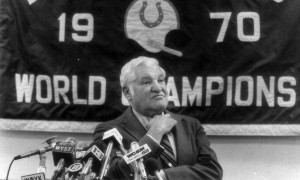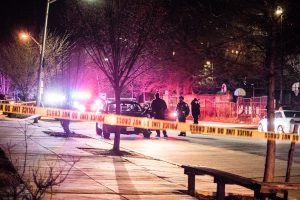No tears were shed around here when the news arrived this week that William Hudnut, former mayor of Indianapolis, died at 84. The obituaries say he died in Chevy Chase. It’s a wonder anybody let him cross state lines.
Hudnut was the man who convinced the owner of the Baltimore Colts, the late Robert Irsay, to move his football team halfway across the country in the middle of a snowy March night three decades ago while nobody was watching.
It’s Irsay who’s always gotten the blame for this – and rightfully so – but while he and his puppets were preparing to sneak out of town, it was Hudnut pulling the strings out in Indianapolis.
As this was more than 30 years ago and we now have a replacement football team here, called the Ravens, there may be some reading this who will say: Let it go. Who cares what happened back there in ancient times, which have nothing to do with today?
These people need to understand that, as William Faulkner once wrote, the past doesn’t go away. It isn’t even the past.
It reverberates to this very day.

What Hudnut and Irsay did was set loose a modern cutthroat bullying of struggling cities by prosperous professional sports teams. Irsay wanted a new ballpark with higher ticket prices and luxury suites and profits beyond all previous counting.
The city, struggling to pay its teachers and its cops and firefighters, struggling with that era’s diminishing tax base, said the millions it would cost for a new ballpark made a new stadium impossible. Out in Indianapolis, William Hudnut said: Hey, Irsay, we’ve got a brand new ballpark waiting for you. Enter, and never look back, and never mind the broken hearts back in Baltimore.
What Hudnut and Irsay did was destroy the myth of a two-way love affair between a community and a team. They cemented the role of blackmail in the world of pro sports. You want to hold onto your ballclub, you pay the Irsay price or watch the team head for the welcoming Hudnuts of the world.
You think not? Ask the fans who thereafter lost teams in St. Louis and Houston and Los Angeles and Oakland.
And – oh, yeah – that team out in Cleveland.
You think all of this exists in the past? Try telling that right now to the fans in Oakland and San Diego, holding their breath over the potential loss of their teams – and never mind fans’ love and support bestowed across the years.
That’s the model created by Irsay three decades ago: Give me what I want, or I’m out of here, and never mind all this nonsense about a municipal love affair. The love is strictly one-way.
And it’s the model created by Hudnut, too. There’s always some city, and some mayor looking to score points, ready to cash in on the other end.
That’s the legacy he takes to his grave.

A former Baltimore Sun columnist and WJZ-TV commentator, Michael Olesker is the author of six books, most recently “Front Stoops in the Fifties: Baltimore Legends Come of Age” (Johns Hopkins University Press). He is also the author of “The Colts’ Baltimore: A City and Its Love Affair in the 1950s” (Johns Hopkins University Press).





